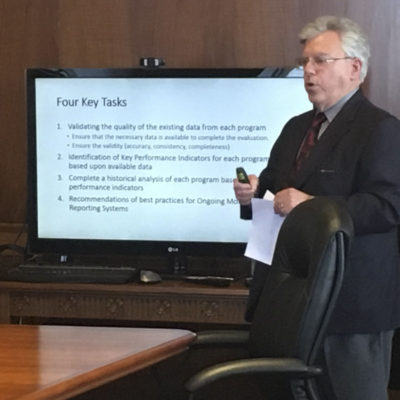
By Paul Thompson
Northeast News
October 20, 2016
KANSAS CITY, Missouri – The KCMO City Council may soon spend as much as $350,000 to compile hard data about the city’s economic development incentive policies.
Ordinance No. 160776 would authorize City Manager Troy Schulte to enter into a contractual agreement with the Council of Development Finance Agencies (CDFA) to “conduct a comprehensive analysis of the City of Kansas City’s historic use of economic development incentives and the resulting impacts.” City Economic Development Agencies included in this study are the Land Clearance for Redevelopment Authority (LCRA), the Tax Increment Financing Commission (TIF Commission), the Downtown Economic Stimulus Authority (DESA), the Enhanced Enterprise Zone Boards (EEZ), the Planned Industrial Expansion Authority (PIEA) and the Kansas City Chapter 353 Advisory Board (353 Board).
The issue of incentive reform has been front and center for the Council of late, and Ordinance No. 160776 itself has been on a fast track: it was originally introduced on October 6, referred to the Planning, Zoning, and Economic Development (PZED) Committee on October 13, discussed with CDFA during a Council work session on Tuesday, October 18, and passed through the PZED Committee on Wednesday, October 19.
Mark Barbash, a senior strategic advisor with CDFA, told Council members during the October 18 work session that the CDFA’s team of experts will hope to accomplish four key tasks over the coming months as they work to unpack Kansas City’s use of economic development incentives: 1) Validate the quality of existing data; 2) Identify key performance indicators; 3) Complete a historical analysis of each economic incentive program; and 4) Provide recommendations of best practices moving forward.
 Barbash noted that CDFA will look both inside the city and outside of it to gather data related to Kansas City’s economic incentive policy.
Barbash noted that CDFA will look both inside the city and outside of it to gather data related to Kansas City’s economic incentive policy.
“For example, we want to be able to measure the asset values; we want to be able to measure increased investments; there are a variety of these kinds of measurements that come from places that are outside of city government,” Barbash said.
KCMO Director of Economic Development Kerrie Tyndall added that the $350,000 ordinance is all about ensuring that Kansas City is utilizing economic incentives as effectively as possible.
“Ultimately, we want to find out whether or not the programs that we’re utilizing are helping Kansas City to be the most competitive city that we can be,” said Tyndall.
Sixth District Councilman Scott Taylor indicated during the October 19 PZED Committee meeting that the city has been looking at gathering more concrete data related to the performance of economic incentive deals for some time.
“We’ve been talking about this as a city for months, if not years, to actually get hard data to see where we’re at in the process,” said Taylor.
Taylor also stated that hiring an independent group to review the city’s economic incentive practices will ensure that the policies are given an honest, hard look. Additionally, Taylor said that economic incentive data should now be easier to access – and comprehend – than ever.
“This will set up a mechanism moving forward so that all of our projects are reporting the same data,” said Taylor. “We’ll have that data, which will help us as decision makers and policy makers moving forward.”
First District Councilwoman Heather Hall noted during the PZED Committee meeting that the economic incentive analysis is expected to take roughly 1,900 hours, at a cost of approximately $180 per hour. For the price, Hall wondered, what exactly would the city receive at the end of the process? Tyndall was quick to respond.
“One of the major objectives of the project is to create a master data set which will centralize all of the key performance metrics for all of the incentive programs across about six different types of tools that we use, so that on a go-forward basis, that information will be more accessible,” said Tyndall.
Tyndall further added that the project will set up the city to invest in technology that will ensure that the next time the city wants an update on the success of its economic incentive policies, they won’t have to wait out the lifetime of a tax-increment financing agreement to do so.
During the October 18 work session, Tyndall explained why the Council was being asked to approve an accelerated effective date for the ordinance.
“We’d like to be able to schedule to come back later on in October for us to actually get the work underway. In order for us to do that, we have to have an executed contract, so that we’re able to reimburse them,” said Tyndall. “It just puts us in a position to be able to get that scheduled sooner than later, because there’s a lot of work that we want to undertake and we’re anxious to get that underway.”
The Council complied with Tyndall’s request, advancing the ordinance during the Planning, Zoning, and Economic Development Committee on Wednesday. If approved, the Council will receive several updates during the course of the project, with final recommendations expected to be provided no later than May of 2017.
During the October 20 KCMO City Council session, the Council authorized the City Manager to propose amendments to the city’s Community Improvement District (CID) policy to address recent CID proposals. That includes the InterContinental Hotel’s successful push to declare itself legally blighted in order to create a single-entity CID at it’s location on the Country Club Plaza.
“The single-owner CID issue is something that has never been addressed,” said Director of Economic Development Kerrie Tyndall.
Ordinance No. 160784 directs City Manager Troy Schulte to look into the CID policy, as recent requests have “created questions as to whether the existing policy adequately reflects the Council’s priorities, provides for the fair treatment of those within certain industries, and provides adequate guidance to the Council in approving new CIDs.” As part of the ordinance, Schulte has been directed to provide potential amendments to the CID policy within a period of 60 days.
4th District Councilwoman Katheryn Shields said during the PZED Committee meeting on Wednesday, October 19 that Ordinance No. 160784 is at least in part a result of the recent request from the InterContinental.
“This is something that’s being sponsored by Councilman Lucas, and I think it just grew out of some discussions that we’ve had recently,” said Shields.


















